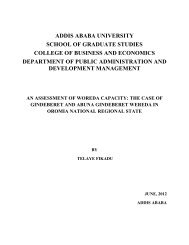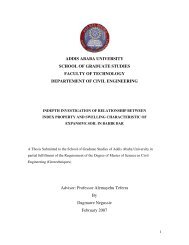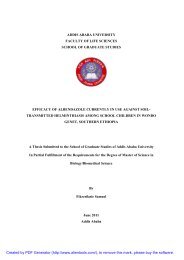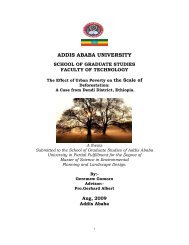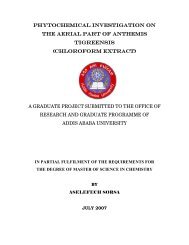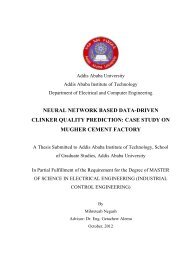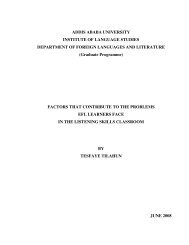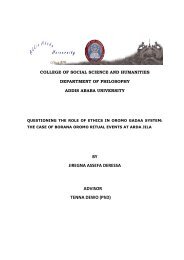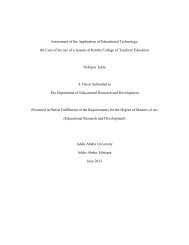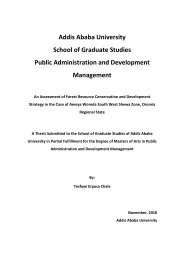HENOK MERHATSIDK 1.pdf - Addis Ababa University
HENOK MERHATSIDK 1.pdf - Addis Ababa University
HENOK MERHATSIDK 1.pdf - Addis Ababa University
You also want an ePaper? Increase the reach of your titles
YUMPU automatically turns print PDFs into web optimized ePapers that Google loves.
distribution of this natural resource will benefit Ethiopia. 24 Secondly, Egypt will stop<br />
hostility and its destructive covert and overt support for hostile neighboring countries will be<br />
reduced once the Nile issue resolved. Therefore, Ethiopia and Kenya have worked hard to<br />
come up with a new agreement on the use of the Nile waters. Under the NBI, the two<br />
countries negotiated with the relevant stakeholders and the result gained from this win- win<br />
deal is appreciable, the two countries are supported by other up stream states and seeing the<br />
Nile in curving famine in the two countries appears a plausible assumption.<br />
5.8. Energy Trade<br />
Every country in the world has energy demand, this demand could not be fulfill only by<br />
domestic sources. The scarcity of energy in day-to-day activity forced countries to buy<br />
energy from other countries that have abundant natural resources. This buying and selling<br />
activity is called as Energy trade. Africa is endowed with abundant energy resources.<br />
However, these resources are remote from demand areas; they are underdeveloped and<br />
accompanied with poor infrastructure. Ethiopia and Kenya both have shortage of energy but<br />
they have planned different ways to mitigate this problem. Ethiopia has abundant water and<br />
suitable topography for generation of hydroelectric power. Kenya is inter-connected with<br />
Tanzania in order to narrow dawn energy demand and supply gap in its territory. Moreover,<br />
Ethiopia agreed to sell 1/3 of Gilgel Gibe III hydroelectric power to Kenya at cheap price<br />
when compared with the current price in Kenya (www.kenyamission-un).<br />
Ethiopia has numerous rivers which have a potential of generating hydroelectric power that<br />
can satisfy the domestic demand and could be exported to neighboring countries. Ethiopian<br />
officials argue that the building of Gilgel Gibe III hydroelectric project and the intended<br />
Gilgel Gibe IV, and Gillgel Gibe V enable the country to sell the excess hydro power from<br />
these projects to Kenya and agreement has been reached between the two governments.<br />
Kenya’s electricity supply comes from both internal and external sources; it has hydro<br />
electric station at dams along the upper Tana river, Turk well George Dam the West and a<br />
petroleum fired plant on the cost, geothermal facilities at olkanria (near Nairobi). Kenya buys<br />
24 Interview with Teshome Shumbe an officer in MoFA, Neighboring Countries Department on<br />
December,2010.<br />
69




